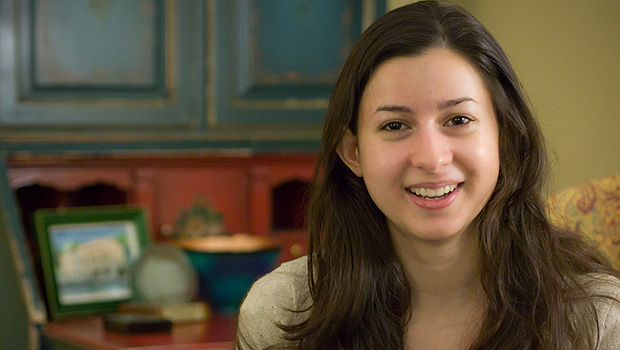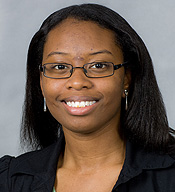
It’s not too early to start thinking about summer. Among the various upcoming events planned to introduce students to their options for transformative summer experiences is the Institute for Public Engagement’s introductory meeting for its Summer Nonprofit Immersion Program.
This afternoon, junior Yasmin Bendaas will be on hand with other former interns to talk about their experiences and answer questions about the Immersion Program from 4-5 p.m. in Room 301 of Reynolda Hall.
Bendaas, who interned at the Kate B. Reynolds Charitable Trust in 2011, strongly endorses the value of the exposure the program gave her.
“We live in a community that has great needs, and there are nonprofits doing fantastic work that I’m sure any student would love to be a part of,” she said. “Inadequate housing? There’s a nonprofit for that. Applying for a grant? There’s a nonprofit for that. Children in need of creative resources? There’s a nonprofit for that.”
The Summer Nonprofit Immersion Program is more than a summer job. It blends essential instruction and collective reflection with meaningful community engagement. Internships span five broad areas: human services, philanthropy, youth enrichment, arts and culture and community development.
“Our students learn that there are numerous ways to enter the nonprofit sector and more broadly serve the community in a way that fuels their passion,” said IPE Assistant Director Velvet Bryant, who manages the program.
“We were all working with organizations that found the gaps in our community and were filling them,” says Bendaas of her experience last summer. “The Institute for Public Engagement automatically sets up the connections for you. “
The Immersion Program begins with a three-day intensive Nonprofit Management Seminar that introduces the interns to the best principles and practices of the nonprofit sector and gives them a working knowledge of their organization before they begin their placement.
“The Non-Profit Management Seminar felt like a crash course in business,” recalls Bendaas. It was a taught by Professor Cynthia Skaar from the Schools of Business and Steve Virgil, Director of IPE, whose background is in law.
“It definitely helped prepare students for the experience of working for a nonprofit and to understand the ins and outs of the nonprofit sector in ways I wouldn’t have known even from working in the office. Without the course, there would have been no way I would have learned so much information in such little time.”
Bryant said: “Through the Management Seminar Students see the breadth of the Nonprofit Sector and how their work strengthens the community in multiple ways.”
Once their internships begin, students meet weekly for a seminar designed to give them an opportunity to examine and reflect upon their internship experience, the needs of the community and their own vocation.
“It is great to do the program with other students who are going through the experience of working for a non-profit organization at the same time as you are,” Bendaas said.
“The weekly Engage Seminar,” Bryant explains, “gives students the time and space to build self-awareness that helps them discover and articulate their passion and purpose. We do this through discussions and reading various articles and books, including ‘How to Find The Work You Love’ by Laurence Boldt and excerpts from the anthology ‘Leading Lives that Matter.’”
At the end of her internship, Bendaas, received a job offer from the Kate B. Reynolds Charitable Trust, where she continues to work while maintaining a full academic and extracurricular schedule. President of WFU’s chapter of Amnesty International, Bendaas organized this fall’s World Culture Dance Off.
Recently, Bendaas sat down to talk at some length about her experience last summer.
Q. Before we talk about your experience in IPE’s Summer Nonprofit Immersion Program, would you say a little a little about yourself?
A. I’m a junior anthropology major and am double-minoring in journalism and Middle East and South Asia studies. I’m also a “townie,” born and raised in Winston-Salem, but with a different background than most: My mother is Iranian and my father is Algerian.
Q. What do you think are some of the most important things for prospective interns to hear from students who have experienced the Summer Nonprofit Immersion Program?
A. For some students, this may be their first 9-5 office job (it was my first), and getting used to both that schedule and environment does take some time. I think it would be significant for prospective students to hear that whether or not they end up really enjoying their internship or not, they will learn a lot about what they are looking for in a future career. You’ll learn what you want in a job, and maybe you will find out there are some things you dislike, but you will have first-hand experience backing your reasoning.
Working with a nonprofit is a rewarding experience. The way the IPE program is set up, you are involved within the Winston-Salem community, and I think that is so significant. Being from here, it is readily apparent to me that Wake Forest is a bubble that is very unrepresentative of Winston-Salem.
Q: How is the Summer Nonprofit Immersion Program different from your average summer job?
A: It is great to do the program with other students who are going through the experience of working for a non-profit organization at the same time as you are. Weekly seminars led by Velvet Bryant were very eye-opening to us and became something I personally really looked forward to.
I got to know a lot of wonderfully passionate students that I had not previously known well at Wake before, and we kind of became a support system for one another, giving advice, discussing our positive and negative experiences, and congratulating one another’s accomplishments.
Although I was the only Wake Forest student in my office (in fact the only person under about 27), the program has the ability to give you independence in the work place as well the support system of the IPE staff and the students within it. It gave me a lot of confidence in my own job to know I had such great people backing me.
Q. Were there aspects of the Seminar that were especially important to you or memorable?
A: A lot of our discussions focused on how to become integrated into the work place. On the one hand, there are a lot of passionate and driven people who come into the Immersion program and then they find themselves in a situation where some of the people they work with may be discouraged by the realities of the job: organizations, especially nonprofits, are struggling with a shortage of resources.
Every student in this program is a passionate and driven person. You really learn how to work with others, and in a nonprofit working as team and having the right kind of communication within makes a huge difference.
Another great thing about the seminars was although I didn’t actually work with other nonprofits in the community, through hearing the experiences of other students working with those organizations, I kind of got an idea of what it would be like. The organization I worked with, the Kate B. Reynolds Charitable Trust, was very different from the other nonprofits students were working for in that it is a grant-making organization. I still got to see what organizations went through that were on the grant-receiving end, and I think that is something very unique to this program – none of our jobs were exactly the same.
Q: Is there an “event” that stands out for you?
A: Yes, the Executive Director of Big Brothers Big Sisters spoke to us at an IPE breakfast one morning. She gave us some advice and said that if she had an intern who had done a good job for her organization, that intern would be the first person she would hire when she had an opening.
To be honest, I didn’t go through this internship with the goal of getting hired at the end of it; I just wanted to learn as much as I could. All of the people working in my division at Kate B. Reynolds hold some type of graduate degree – I didn’t think a job was really in the picture for me.
But at the end of my Summer Nonprofit Immersion internship with the Kate B. Reynolds Charitable Trust, they asked me if I wanted to work during the school year for them. My title was changed from Intern to Program Aide, and I absolutely love my job and the people I work with. As surprised as I was to get hired at the end of the internship, I am always reminded of the advice that was given to me by the Executive Director and also that there is no way I would have gotten this job without being a part of the IPE program.
Q. Your work with Kate B. Reynolds Charitable Trust provided you with a window into the funding side of non-profit work: grant making.
A. Yes, my organization does the grant giving, while the other students worked for non-profits on the grant-receiving side. The Kate B. Reynolds Charitable Trust is the second largest trust in the state, after the Duke Endowment. At work I’ve learned a lot about how we handle the application process, how we announce requests for proposals, etc. From this perspective I see all the processes organizations seeking resources go through.
A lot of the students in the Summer Nonprofit Immersion Program went through the steps of grant writing, rather than grant making, with their organizations, which is extremely important. I even joined in on one grant-writing workshop hosted by the Institute for Public Engagement to get a better understanding of it.
Q: How did the Program shape your thinking about vocation?
A: The weekly Seminar throughout the Immersion experience focused us directly on questions of vocation. I think it’s a question a lot of rising college seniors face – “What are you going to do with your life?” Our discussions surrounding vocation allowed us to examine obtaining a job for security and getting a job doing what we love and that there is overlap. It’s really about finding your place and finding that balance. I can’t imagine working 9-5 every day doing something I dislike.
Q: How did it shape your thinking about your education?
A: It reinforced my thinking about education: learn from what you can, wherever you can. I think it’s important to be able to recognize opportunities, inside and outside of the classroom as opportunities for learning and self-understanding. I learned a lot about myself through my job because working in an office was something I hadn’t done before. You grow a lot by putting yourself in different environments.
Q: Have certain skills become more important to you?
A: It is important to learn to adapt. Sometimes I’d get assignments that I didn’t exactly want to do or didn’t think I could do. I grew the most from taking on those tasks.
Q: What are you thinking about for the future?
A: Although I don’t think I will enter the realm of public health (the primary focus area for Kate B. Reynolds Charitable Trust) post-grad, it is a field I’ve definitely come to admire. And I know the things I’ve gained from my job are extremely valuable to whatever path I take.
Right now, I plan on applying to graduate school for anthropology, possibly with a research focus on North Africa. From my work experience gained through the Institute for Public Engagement, I’ve learned a lot about what I want in a future job and I have something very concrete to base that on. Working through the Summer Nonprofit Immersion Program has really given me a lot of direction, confidence and clarity in what I’d like to do in the future.
Categories: Community, For Alumni, For Parents, Student, Top Stories, Wake Forest College
Headlines
Wake Forest in the News
Wake Forest regularly appears in media outlets around the world.





